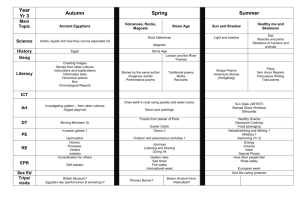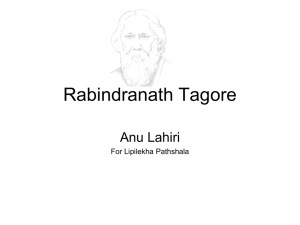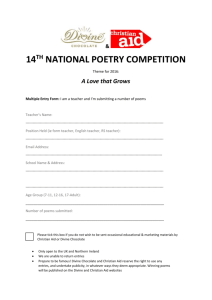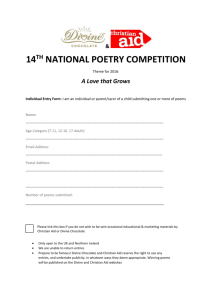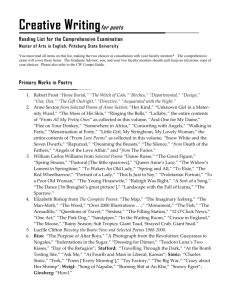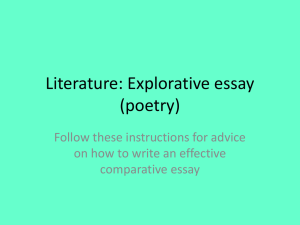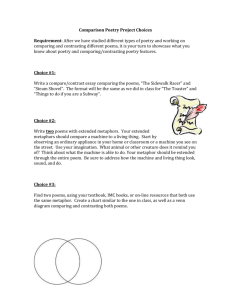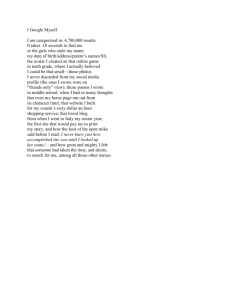American Literature: 1910
advertisement
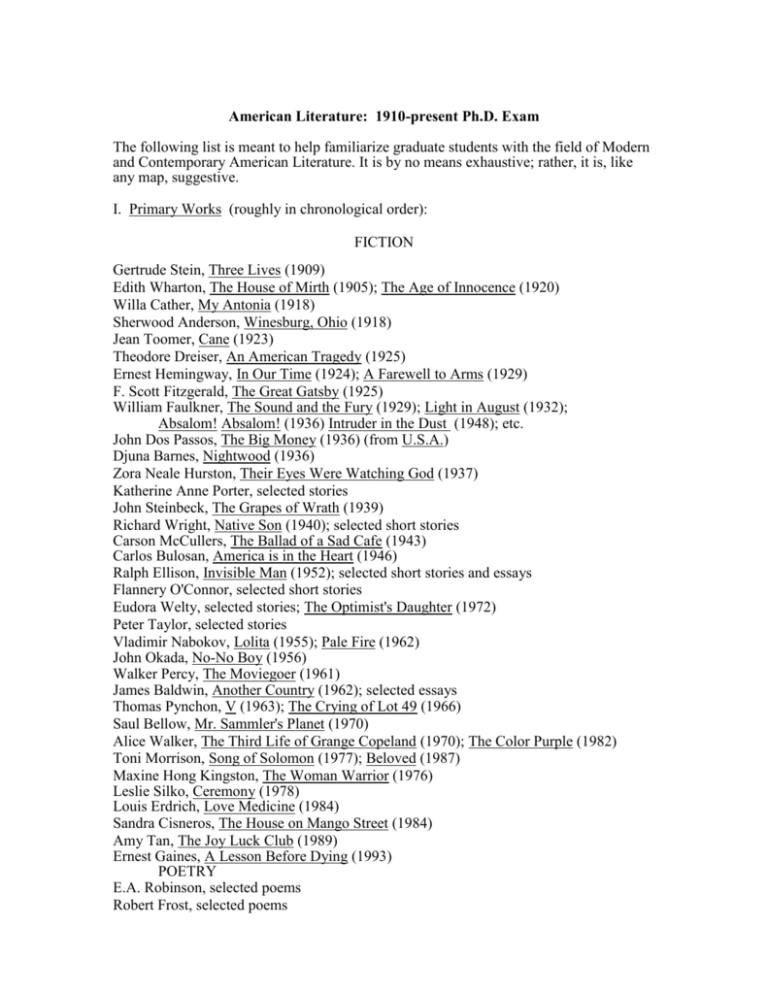
American Literature: 1910-present Ph.D. Exam The following list is meant to help familiarize graduate students with the field of Modern and Contemporary American Literature. It is by no means exhaustive; rather, it is, like any map, suggestive. I. Primary Works (roughly in chronological order): FICTION Gertrude Stein, Three Lives (1909) Edith Wharton, The House of Mirth (1905); The Age of Innocence (1920) Willa Cather, My Antonia (1918) Sherwood Anderson, Winesburg, Ohio (1918) Jean Toomer, Cane (1923) Theodore Dreiser, An American Tragedy (1925) Ernest Hemingway, In Our Time (1924); A Farewell to Arms (1929) F. Scott Fitzgerald, The Great Gatsby (1925) William Faulkner, The Sound and the Fury (1929); Light in August (1932); Absalom! Absalom! (1936) Intruder in the Dust (1948); etc. John Dos Passos, The Big Money (1936) (from U.S.A.) Djuna Barnes, Nightwood (1936) Zora Neale Hurston, Their Eyes Were Watching God (1937) Katherine Anne Porter, selected stories John Steinbeck, The Grapes of Wrath (1939) Richard Wright, Native Son (1940); selected short stories Carson McCullers, The Ballad of a Sad Cafe (1943) Carlos Bulosan, America is in the Heart (1946) Ralph Ellison, Invisible Man (1952); selected short stories and essays Flannery O'Connor, selected short stories Eudora Welty, selected stories; The Optimist's Daughter (1972) Peter Taylor, selected stories Vladimir Nabokov, Lolita (1955); Pale Fire (1962) John Okada, No-No Boy (1956) Walker Percy, The Moviegoer (1961) James Baldwin, Another Country (1962); selected essays Thomas Pynchon, V (1963); The Crying of Lot 49 (1966) Saul Bellow, Mr. Sammler's Planet (1970) Alice Walker, The Third Life of Grange Copeland (1970); The Color Purple (1982) Toni Morrison, Song of Solomon (1977); Beloved (1987) Maxine Hong Kingston, The Woman Warrior (1976) Leslie Silko, Ceremony (1978) Louis Erdrich, Love Medicine (1984) Sandra Cisneros, The House on Mango Street (1984) Amy Tan, The Joy Luck Club (1989) Ernest Gaines, A Lesson Before Dying (1993) POETRY E.A. Robinson, selected poems Robert Frost, selected poems Ezra Pound, selected poems (including selections from The Cantos, e.g. I-IV, XXXI, XLV, XLIV, LXXXIII) T.S. Eliot, selected poems (including, at least, The Wasteland ,1922) H.D. (Hilda Doolittle), selected poems; Trilogy Marianne Moore, selected poems Wallace Stevens, selected poems e.e. cummings, selected poems Hart Crane, selected poems; The Bridge William Carlos Williams, selected poems; Paterson Allen Tate, selected poems Robert Penn Warren, selected poems Langston Hughes, selected poems Robert Lowell, selected poems Theodore Roethke, Words for the Wind Charles Olson, The Maximus Poems Elizabeth Bishop, selected poems Gwendolyn Brooks, selected poems Denise Levertov, O Taste and See Allen Ginsberg, Howl and Other Poems Sylvia Plath, selected poems Adrienne Rich, selected poems W.S. Merwin, selected poems John Ashbery, selected poems James Merrill, The Divine Comedies Audre Lord, selected poems Joy Harjo, selected poems Thom Gunn, The Man with Night Sweats DRAMA Susan Glaspell, Trifles (1916) Eugene O'Neill, The Hairy Ape (1922); Long Day's Journey Into Night (1956) Clifford Odets, Waiting for Lefty (1935) Lillian Hellman, The Little Foxes (1939) Thornton Wilder, The Skin of Our Teeth (1942) Tennessee Williams, The Glass Menagerie (1945); A Streetcar Named Desire (1947); Cat on a Hot Tin Roof (1955); The Night of the Iguana (1961) Arthur Miller, Death of a Salesman (1949); The Crucible (1953) Edward Albee, Who's Afraid of Virginia Woolf? (1962) Amiri Baraka, Dutchman (1964) Sam Shepard, Buried Child (1974); True West (1981) David Mamet, American Buffalo (1977); Glengarry Glen Ross (1983) David Rabe, Streamers (1977) Beth Henley, Crimes of the Heart (1981) Marsha Norman, ‘Night, Mother (1981) August Wilson, Ma Rainey (1985); Fences (1986) David Henry Hwang, M. Butterfly (1988) Tony Kushner, Angels in America, pt. 1: Millennium Approaches (1992) II. Secondary Works: Students taking the exam are expected to select, read and be able to cite secondary criticism, literary history, and critical theory--enough to provide a grounding in the movements, periods, techniques, and critical issues that are important in relation to the texts on the reading list. You might find the work of some of the following critics useful in gaining a better sense of the field. Charles Altieri Houston A. Baker, Jr. Bernard Bell Barbara Christian Cathy Davidson Leslie Fiedler Henry Louis Gates Sandra M. Gilbert and Susan Gubar Hugh Kenner Jerome Klinkowitz Frank Lentricchia Walter Benn Michaels Cary Nelson Marjorie Perloff Donald Pizer Louis D. Rubin, Jr. Robert Stepto Eric Sundquist


